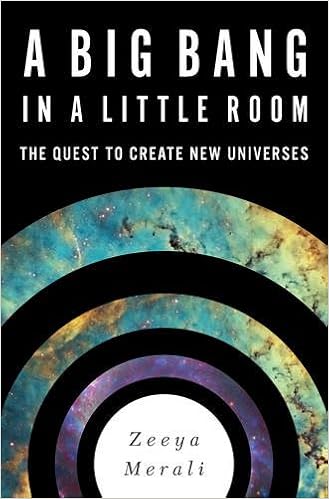 Further to “Atheist cosmologist warns “deeply religious” people not to put their faith in “apparent” fine-tuning” (Nature), Columbia mathematician and string theory skeptic Peter Woit (of Not Even Wrong) offers a review at Wall Street Journal of the same book, A Big Bang in a Little Room: The Quest to Create New Universes by Zeeya Merali, “Searching for God at the Centre of the Big Bang,” in which h notes,
Further to “Atheist cosmologist warns “deeply religious” people not to put their faith in “apparent” fine-tuning” (Nature), Columbia mathematician and string theory skeptic Peter Woit (of Not Even Wrong) offers a review at Wall Street Journal of the same book, A Big Bang in a Little Room: The Quest to Create New Universes by Zeeya Merali, “Searching for God at the Centre of the Big Bang,” in which h notes,
…
Mr. Guth was initially fascinated by the idea of baby universes getting produced and making up a multiverse, though he imagined these other universes would all have the same physics as ours. Ms. Merali relates that he quickly lost interest: Why care much about cosmological models producing not just our universe but other copies we can never observe? Over the past 15 years, however, Mr. Linde’s slightly different argument—for a multiverse of universes, each with different physics, has become very popular. Such a multiverse even provides an explanation for the lack of progress in recent decades toward a better understanding of where fundamental laws of physics come from: The laws we observe are just artifacts of where various inflaton fields happened to randomly end up after our Big Bang; in other universes, the laws are different. Ms. Merali gives a disturbing version of this, contemplating the possibility that “string theory and inflation may be conspiring against us in such a way that we may never find evidence for them, and just have to trust in them as an act of faith.”
…
In an era where “post-truth” was the word of the year, scientists and science writers need to make clear that science is not a species of theological or philosophical speculation and not about belief or entertainment value. Legitimate scientific claims are those that can be backed up with evidence, and unfortunately the wonderful and exciting story told well here contains none at all. (paywall; no paywall) More.
It’s not a blip actually. It’s a trend toward de-emphasizing fact, evidence, and truth in favour of narrative, spin, and talking points.
See also: The war on falsifiability in science continues
Atheist cosmologist warns “deeply religious” people not to put their faith in “apparent” fine-tuning Why are atheists so solicitous about theists who, they fear, will lose their faith? The reality is that the only faith many of us are rapidly losing is in government of science by atheists. Take the unstoppable crises of peer review, for example.
2016 as the worst year ever for fake physics
and
Multiverse cosmology at your fingertips
Follow UD News at Twitter!